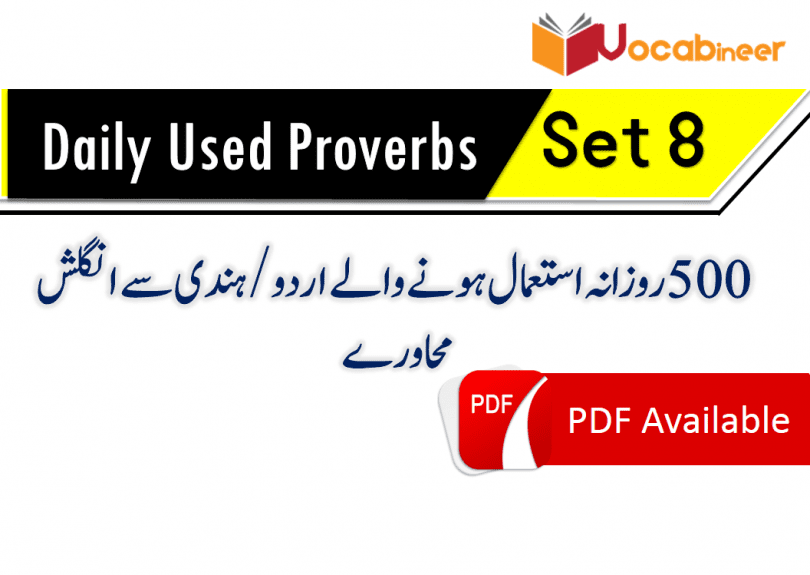In this blog post, you will learn how proverbs strengthen language skills and offer practical wisdom for everyday life. Proverbs are short sayings that carry deep meanings, often reflecting cultural values and life lessons. For middle school learners, understanding proverbs and their meanings not only builds vocabulary but also sharpens thinking and moral insight. These expressions help students relate language to real-world experiences, making English easier to remember and more meaningful to use.
English Proverbs with Urdu Meanings
| Urdu Proverbs | Roman Urdu | English Translation |
|---|---|---|
| تیل دیکھو تیل کی دھار دیکھو | Tail dekho tail ki Dhar dekho | Watch the oil and watch it pour |
| لوہے کے چنے چبانا | Lohay ke chane chabana | Hard nut to crack |
| بچہ بغل میں ڈھنڈورا شہر میں | Bacha Baghal main Dhindora Shehar main | Child is in the armpit, chaos in the city |
| لالچ بری بلا ہے | Lalich buri bala hai | Avarice is the root of all evils |
| لکیر کا فقیر | Lakeer ka Fakeer | To go about the same old beaten path |
| جو گرجتے ہیں وہ برستے نہیں | Jo garjtay hain wo barastay nahi | Barking dogs seldom bite |
| نیم حکیم خطرہ جان | Neem hakeem khatra jaan | A little knowledge is a dangerous thing |
| اپنے منہ میاں مٹھو | Apnay moun miyan mitho | Fool to others, to himself a sage |
| بخل میں چھری منہ پے رام رام | Baghal main Churi, moun pay Ram Ram | A wolf in lamb’s clothing |
| آپ بھلے تو جگ بھلا | Aap bhalay to jag bhala | Good mind, good find |
| بوئے پودے ببول کے، آم کہاں سے ہوئے | Boay poday babol k, aam kahan say hoay | Gather thistles and expect pickles |
| نیکی کر دریا میں ڈال | Neki kar dariya mein daal | Do good and forget about it |
| اونٹ کے منہ میں زیرہ | Oont ke moun mein zeera | A drop in the ocean |
| اونٹ کے پاؤں میں بیل | Oont ke paon mein bail | A small thing in a big place |
| اپنی چادر دیکھ کر پاؤں پھیلاؤ | Apni chadar dekh kar paon phelao | Cut your coat according to your cloth |
| اندھیرے میں تیر چلان | Andheray mein teer chalana | Shooting arrows in the dark |
| اندھا بانٹے ریوڑیاں، اپنے اپنے کو دے | Andha baantay rewarian, apne apne ko de | Blind man shares sweets, keeps them for his own |
| جو بوؤ گے، وہی کاٹو | Jo bow gay, wohi kato | You reap what you sow |
| دال میں کالا | Daal maen kala | More to it than meets the eye |
| لوہے کے چنے چبانا | Lohay k chany chabana | Hard nut to crack |
| آگے کنواں پیچھے کھائی | Aagy kuwan pechay khaee | Between the devil and the deep-sea |
| لالچ بری بلا ہے | Lalich buri bala hay | Avarice is the root of all evils |
| جلے پر نمک چھڑکنا | Jalay par namak cherkna | Rubbing salt on one’s wound |
| جو گرجتے ہیں وہ برستے نہیں | Jo garjtay hain wo barastay nahi | Barking dogs seldom bite |
| ناچ نہ جانے آنگھن ٹیڑھا | Naach na janay angan terha | A poor worker blames his tools |
| انتھ بھلا تو سب بھلا | Anth bhla to sab bhla | All’s well that ends well |
| اپنے منہ میاں مٹھو | Apnay moun miyan mitho | Fool to others, to himself a sage |
| اب پچھتائے کیا، جب چڑیاں چگ گئیں کھیت | Ab pachtay kya jab chiryan chug gaen khait | No use crying over spilt milk |
Read More


